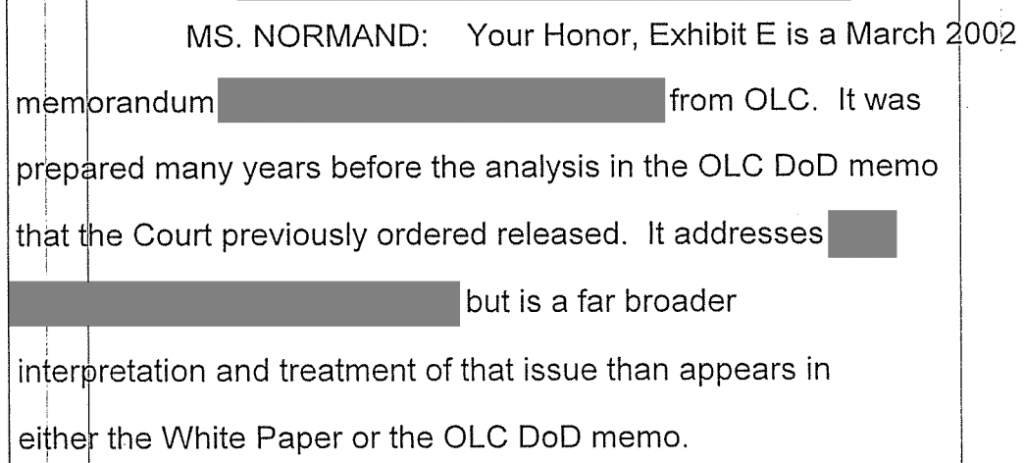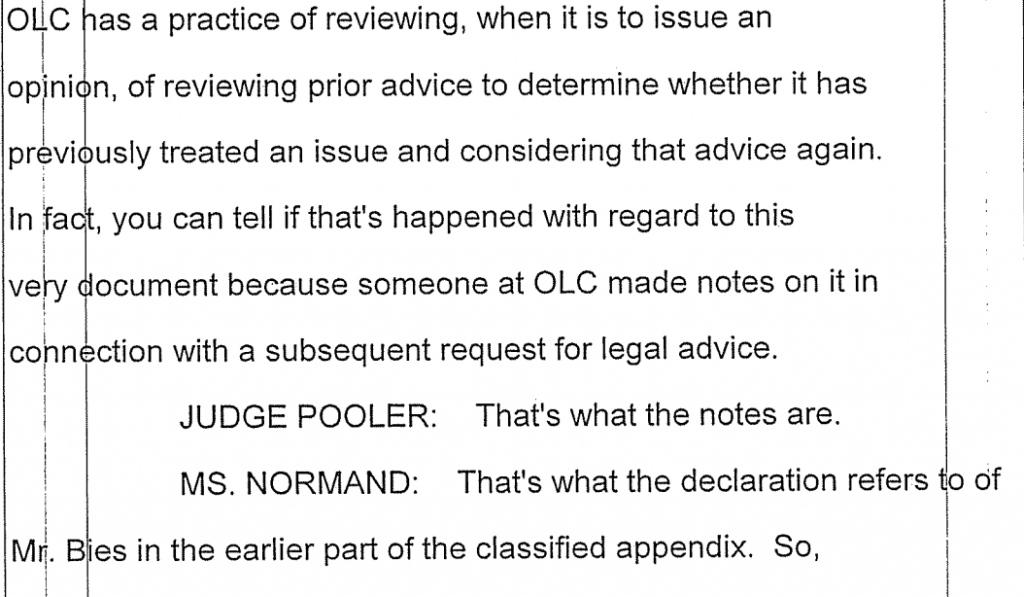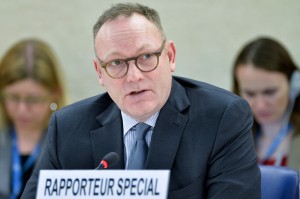
The second-to-last witness in the government’s case against Jeffrey Sterling, FBI Special Agent Ashley Hunt, introduced a number of things she had collected over the course of her 7.5 year investigation into James Risen’s chapter on Operation Merlin. That included a few things — most notably two lines from Risen’s credit card records from 2004 — that in no conceivable way incriminated Sterling.
On November 17, 2004, Risen charged €158.00 at the Hotel Inter-Continental in Vienna, Austria on his credit card (the provider of which DOJ included in its exhibit). On November 21, 2004, Risen put another €215.30 in Inter-Continental charges on his credit card.
What Agent Hunt had proven by highlighting these two details was that James Risen traveled to Vienna as background for a book chapter set in Vienna, and even went to the hotel where Merlin had stayed. None of that did a thing to prove that Sterling leaked Merlin’s travel information — or anything else — to Risen. But the government decided to gratuitously enter into evidence that they had seized years of Risen’s credit card records, and in doing so obtained details of where Risen had traveled (and also, on what days his daughter sent something via FedEx). It wasn’t enough that we knew that already from court filings. DOJ still saw the need to introduce gratuitous notice that they had all of Risen’s credit card statements into the court record.
“We own you,” seemed to be the message to Risen from this flaunting of his credit card records.
But don’t worry, Eric Holder generously decided not to call Risen to testify against Sterling after having hounded him — in this and the warrantless wiretap investigation — for 6 years already, both Jack Goldsmith and Ben Wittes insist.
Both men seem to vastly underestimate how DOJ’s actions in the last decade impact journalism. And both men seem to misunderstand what just happened in the Jeffrey Sterling trial, where DOJ succeeded in exposing a man to 40 years in prison, based largely on metadata, without even having the key pieces of evidence at issue in the case (almost certainly because of CIA’s doing, not Sterling’s).
Uncharacteristically, Wittes’ post is less annoying that Goldsmith’s. Sure, as he did with Laura Poitras, Wittes appointed himself the arbiter of what the NYT should and shouldn’t tolerate from journalists it pays. I will remember that Wittes believes an employee’s intemperate rants on Twitter should get close scrutiny by their employers the next time Wittes makes factually flawed defenses of his torturer buddies on Twitter or complains when Chris Soghoian tweets about Keith Alexander’s operational security sloppiness when he rides on Amtrak.
But Goldsmith writes two paragraphs about leak prosecutions that — while they may bolster Goldsmith’s questionable claims about how journalism functions to rein in the Executive — entirely miss the point. I’ll take them in detail here:
Third, Holder could have called Risen to testify in the Sterling case – the law was clearly on his side, and DOJ attorneys wanted him to do it. But Holder directed his lawyers to let Risen off the hook. It is simply wrong to say (as Risen did) that Holder was doing the “bidding of the intelligence community” or sending “a message to dictators around the world that it is okay to crack down on the press and jail journalists.” Quite the contrary.
The notion that the trial Holder’s DOJ just staged in Eastern District of Virginia was not about “doing the bidding of the intelligence community” makes me tear up I’m laughing so hard. A very key part of the trial was putting Bob S on the stand so he could make claims about Operation Merlin — which turned out not to be backed up by the documentary evidence or his asset’s memory — so as to be able to claim, “We have demonstrated we did this very carefully.” This was a clusterfuck of an operation, but nevertheless DOJ gave Bob S a day and a half to try to claim it wasn’t. DOJ offered CIA this favor while playing their classification games (this was, after all, EDVA, an improper venue for almost all of the charges, but a very good place to get favorable treatment for security theater) so as to avoid explaining — except when it became handy for Condi to blurt something out — why this operation went from being a clandestine information collection operation to something far more sensitive, which is probably the real reason someone other than Sterling leaked the information as the government was trumping up war against Iraq, the next country that got the Merlin treatment.
It’s EDVA, Goldsmith!!! The same place Holder went to have John Durham pretend to investigate CIA’s obstruction of justice until the statute of limitations expired! The same place Holder went to keep investigating and investigating until DOJ could deliver a head, any head, to punish Gitmo defense attorneys’ crazy notion that they might have good reason to want to learn how and who anally raped their clients in the name of rehydration such that they’re still bleeding, 12 years later.
EDVA has become, under Holder, where DOJ goes to obtain arbitrary judgments that ensure CIA and other agencies will never be held accountable for crimes, but some low-level leaker will be delivered up anytime CIA’s crimes or incompetence get exposed.
Fourth, Risen’s complaints about Holder rest in part on the fact that Holder has presided over many more leak prosecutions than any prior Attorney General. I suspect that any Attorney General would have ramped up the leak prosecutions in light of the unprecedented cascade of deep secrets from the government in the last decade.
Here Goldsmith makes the same nonsensical claim that Steven Aftergood made for The Intercept’s profile of Stephen Kim. The investigation into James Risen’s stories has been going on for twelve years. The investigation into Risen’s reporting on Operation Merlin started over four years before Chelsea Manning even joined the Army, much less started the torrent of leaks Goldsmith claims justifies all these investigations.
And the ratio of leak prosecutions to leaks remains tiny.
This line comes right out of Holder’s defense of his leak prosecutions the other day. And it’s true. But it’s a big part of the problem. Thus far, after all, James Cartwright has not been indicted for allegedly leaking a far more sensitive counter-proliferation program targeting Iran than Sterling purportedly leaked. No one is even considering prosecuting Leon Panetta for leaking details of the Osama bin Laden raid (or classified details in his memoir). I doubt David Petraeus will be indicted either for letting his mistress have access to all his most intimate secrets.
The people who get prosecuted — Jeffrey Sterling, John Kiriakou, Donald Sachtleben, Stephen Kim — they’re not the problem behind this system of leaking and in several cases it’s very clear they’re not even the key leakers: instead, they’re the human detritus the government can dispose of so others will see just how arbitrary the secrecy system really is, by design.
But in any event, it must be true that these prosecutions have had a chilling effect on leakers (i.e. sources) and in that sense made journalists’ jobs harder. Of course chilling criminal leaks is the whole point of the prosecutions. They do not “wreck” the First Amendment if they are consistent with the First Amendment, which they are, especially since the prosecutions have not had any noticeable macro effect on the steady flow of secrets out of the government.
I suspect Risen would say this is not the case. I suspect a number of the other journalists targeted by DOJ would say the same. That is, the point is not about stopping leaks (though I think the Insider Threat system will make it easier to pick and choose which human detritus will be the next sacrificed to feed this arbitrary system of control), but often as not burning certain journalists or others who don’t play the game.
We own you, investigative journalist, and know what you did in Vienna back in 2004.
Note also that Risen and other journalists tend not to talk about the countervailing norms that have moved dramatically in journalists’ favor in the last decade. (I have written about this extensively, here and here and here and here.) Not only has the government significantly raised the bar for going after journalists’ sources, but it has also made clear what was not clear a decade ago: it will not prosecute journalists for publishing classified information in clear violation of 18 USC 798.
I think here Goldsmith misses the novel theory the government used to convict Sterling, the one Holder has deemed the model to go after others.
Under this theory, journalists will be treated as empty vehicles, and the “cause to leak” language in the Espionage Act will be blown up, so that even completely unclassified conversations may be deemed the cause of an investigative journalist with sources throughout the CIA publishing a story. And the jurisdiction, too, will be blown up, so that so long as a single hairdresser buys a book in EDVA — or maybe MD, who cares, really?!?! — then DOJ can stage their witch hunt in EDVA with all its trappings of security theater.
There are some interesting theories behind the successful prosecution of Sterling for a bunch of metadata. And Goldsmith might at least familiarize himself with where Holder’s DOJ is taking the Espionage Act, because it deserves more scrutiny before the Sterling prosecution is deemed to have done no damage to the journalistic process.
Given this change in norms and the structural factors pushing secrets out (size of bureaucracy, digitalization of secrets, and the like), it is very hard to conclude that the advantage on secrecy versus transparency has shifted to the government under Holder.
Again, the underlying problem is the asymmetry involved. The government keeps hiding more and more stuff — the top officials behind its trust-building CVE program, even! — behind a veil of secrecy. That amid increasingly absurd claims of secrecy — and increasingly persistent evidence the secrecy often serves to hide law-breaking or incompetence, as it did with the Merlin caper — more secrets get out should be no great celebration. It’s the structure of it all — the paranoia, the arbitrariness, and the incompetence behind it all — that really sours any claim to democratic governance. Goldsmith may take solace we’re getting more secrets out, but until we reverse the slide into arbitrariness it heralds, I’m not so sanguine.
During the hearing just after the defense closed in the Sterling trial, there was a fascinating discussion, largely about how DOJ planned to blow up the “cause” language in the Espionage Act to further criminalize just talking to journalists, to criminalize publishing a book and deigning to distribute it in EDVA. The conversation kept coming back to how DOJ had gone from treating Risen as a criminal weeks earlier to treating him as an innocent naif who channeled Sterling’s spying to the unwitting citizens of EDVA. Judge Leonie Brinkema at one point said, “If Risen were not protected by the newsman’s privilege, I suspect he would have been named as a co-conspirator.” “There is no newsman’s privilege,” defense attorney Edward MacMahon pointed out, laughing at the absurdity of claiming there was after the 3 year battle over just that topic. But the exchange hung there, pregnantly, because ultimately branding Risen a criminal — or, barring that, branding having even unclassified conversations with Risen as criminal — was a big part of the point of this trial.
What this prosecution did — what, I believe, it was designed to do — was two-fold. First, burn Risen, burn Risen over 12 long years of investigation during which the counterpart investigation even reportedly seized his phone records. But also, to herald a new interpretation of the Espionage Act that will criminalize even having phone calls with a journalist who has reported on completely unclassified stories involving you in the past.
Update: Year on Risen’s credit card records corrected per Rich.





